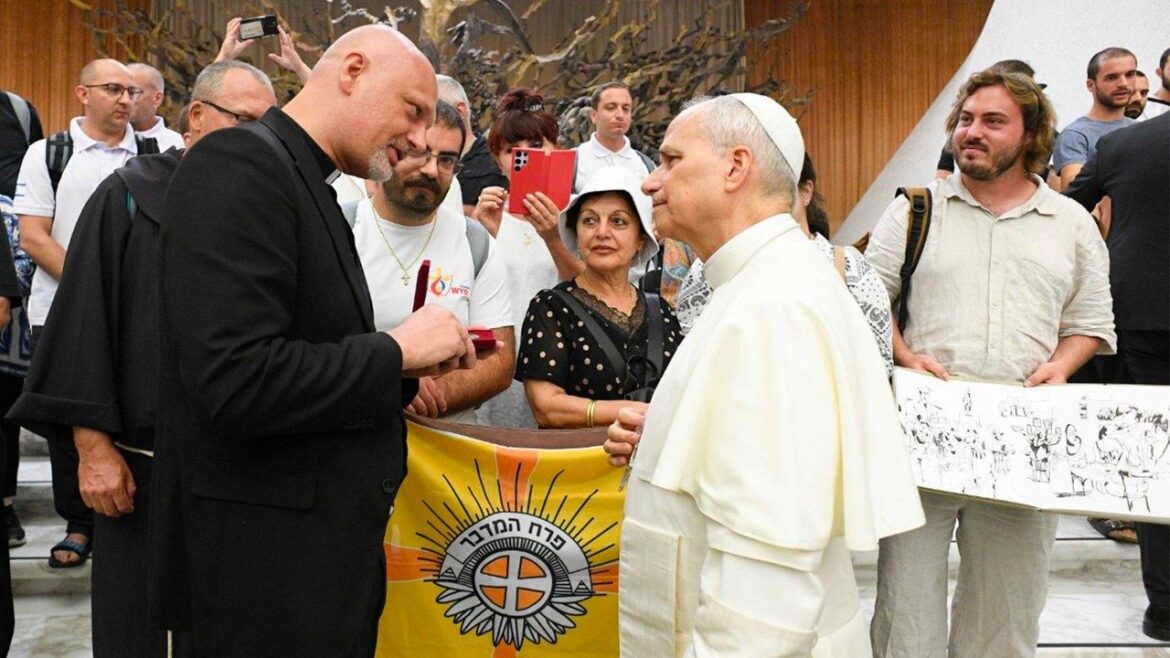Fr. Piotr Zelazko recently led a group of Hebrew-speaking Catholics from Israel on a pilgrimage to Rome, where they attended the Pope’s weekly General Audience and prayed for peace.
By Fr. Paweł Rytel-Andrianik & Karol Darmoros
They live in Israel, speak Hebrew, and are Catholic. While the members of the Vicariate of St. James for Hebrew-speaking Catholics had previously met with figures such as St. John Paul II, this was the first time they came together as a Vicariate to meet the Pope.
“We are happy that we could meet the Holy Father. I told him that we are Hebrew-speaking Catholics, we have seven communities in Israel, and we ask him not to forget us,” said Fr. Piotr Zelazko, Patriarchal Vicar of St. James for Hebrew-speaking Catholics in Israel, speaking to Vatican News.
The Holy Father welcomed the pilgrims with a smile and an open heart. “It was the culmination of our pilgrimage. The Pope blessed us and spoke with us. It was an incredibly moving encounter,” Fr. Zelazko added.
Abi, one of the pilgrims, said he felt at home in Rome. “We are 100% Israelis and 100% Catholics, and we pray for peace,” he said.
Another pilgrim, Nadav, stressed that the roots of the Church are in the Holy Land. “Our patron, St. James, was a Jew and spoke Hebrew. We are a sign of hope, and we pray for peace in the Holy Land between Israelis and Palestinians,” he affirmed.
Holy Door and prayer in Hebrew
The pilgrims visited Rome’s basilicas and catacombs, praying in Hebrew. “I am certain that in many of these places, the Eucharist was celebrated in Hebrew for the very first time,” Fr. Zelazko noted.
A particularly striking moment came as the group passed through the Holy Door of St. Peter’s Basilica. “We did not feel like guests. St. Peter was born in Galilee; St. Paul was a Jew, so we were at home,” the priest underlined.
70 years of the St. James Vicariate
The St. James Vicariate was established in 1955 and today embraces seven Hebrew-speaking communities in Israel. It is a small but vibrant part of the Latin Church in the Holy Land.
“We have parish life, youth groups, and summer camps for children… We are a minority, but we try to be a bridge between Jewish society and the Church,” Fr. Zelazko said, encouraging the faithful worldwide to support the mission of the Vicariate.
The Hebrew-speaking Catholic community has enjoyed the support of successive Popes. St. John Paul II played a vital role, welcoming members of the community, becoming the first Pope to visit a synagogue in Rome, and praying at the Western Wall in Jerusalem.
His gestures broke down barriers and opened new paths for Catholic-Jewish dialogue. The Vicariate’s jubilee also coincides with the 60th anniversary of Nostra aetate, the Vatican II declaration on the Church’s relations with other religions.
A mission of hope
Hebrew-speaking Catholics, living in a land scarred by conflict, seek to bear witness to peace.
“The world in the Middle East needs people who show that peace is possible,” Fr. Zelazko said.
Their presence in Rome and their prayer in the language of the Apostles serve as a reminder that the Church’s roots are in the Holy Land—and that this small community has a great mission today: to be beacons of unity, peace, and hope.



